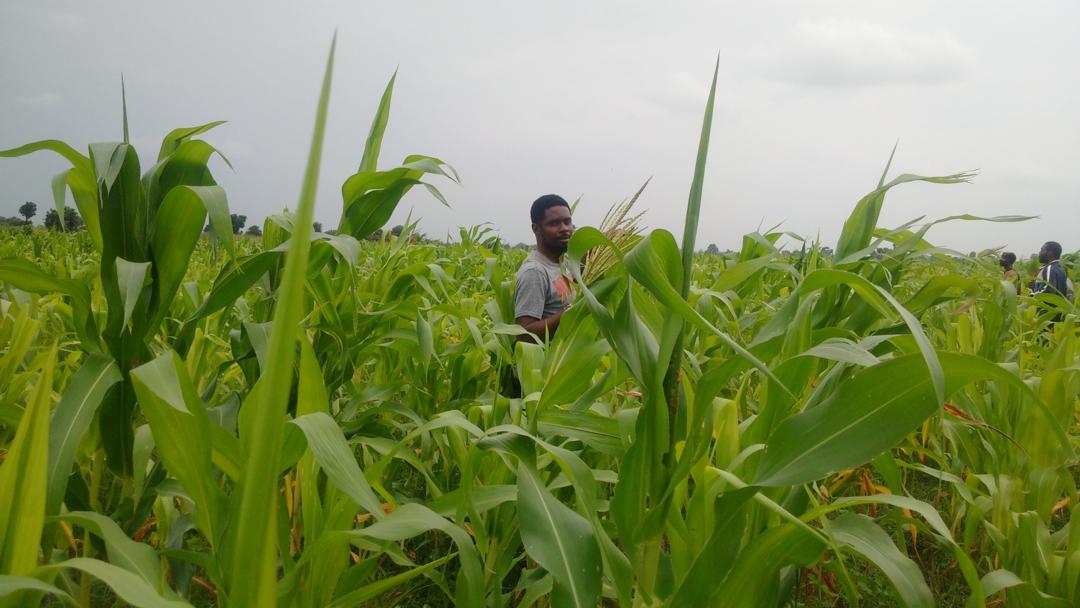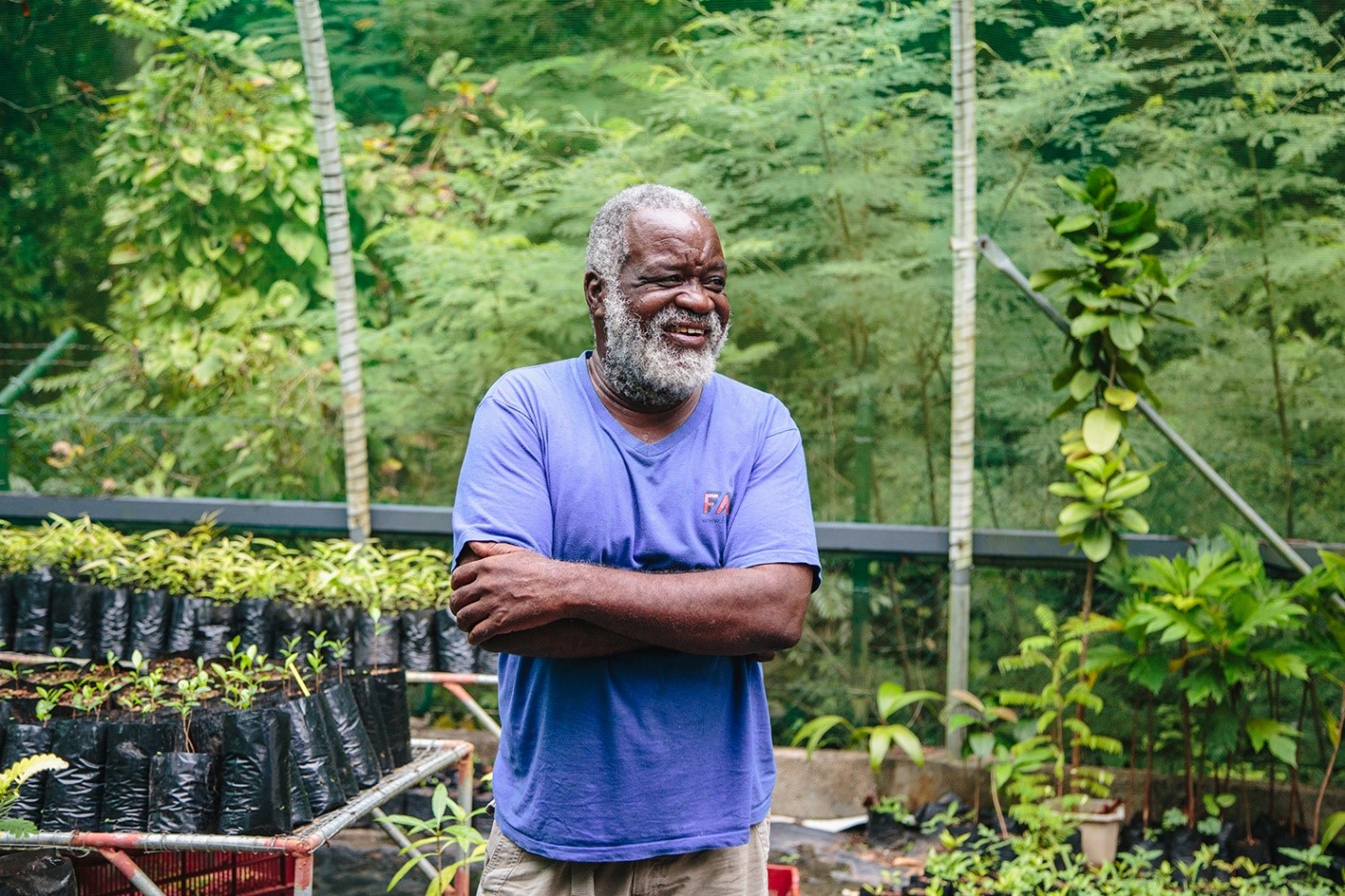Success stories in development provide a source of inspiration for people to innovate and think ahead. Though climate change is often viewed as a complex problem to communicate, media experts have noted that storytelling is one of the most powerful ways to transform complex topics and break them down into something that feels personal, localized, and solvable.
For too long, the narrative surrounding Africa’s development has been one of stagnation and decline, yet there are also numerous lively examples that show how a participatory approach – including all actors – to development can stimulate the creativity of all involved.
Natural seawalls in the Seychelles
Victorin Laboudallon’s is an inspiring story of how one grandfather from the Seychelles set up his own organization to plant forests and tackle climate change. He built a network of volunteers, from children to retirees, whom he calls upon to help him with replanting.
Sea levels are rising at an alarming rate in Seychelles, but instead of leaving the matter to the government, Laboudallon decided to take action by planting mangrove trees, which help defend against the impacts of rising seas and coastal erosion by reducing the height and force of the waves before they hit the shoreline.
The power of mangroves to protect both the land and coral has pushed the United Nations Environmental Programme (UNEP) to see these trees as a ‘super solution’ to climate change. Under a global adaptation project called Ecosystem-based Adaptation South, or EbA South, the government of Seychelles has been working with leaders like Victorin Laboudallon. Funded by the Global Environment Facility, the project uses nature to defend against climate impacts in three ecosystems—coastal habitats in Seychelles, dry deserts in Mauritania and mountainous forests in Nepal.
The Great Green Wall
The Great Green Wall is an African-led movement to grow an 8,000 kilometer wall of vegetation across the entire width of Africa. Roughly 15 percent is now underway, helping to bring back Africa’s degraded landscapes at an unprecedented scale, while providing food security, jobs and enhanced livelihoods.
The initiative is designed to prevent the spread of the desert and the consequent destruction of water supplies and livelihoods. Once completed, the Great Green Wall is expected to be the largest living structure on the planet, and aims to create 10 million jobs in rural areas by 2030.
Nigerian Network of Young Farmers

Promise Amahah, a young farmer, agribusiness expert, and development consultant, aims to foster a vibrant new generational farming sector with ‘the Nigerian Young Farmers Network‘.
To build the organization, Amahah created a dynamic team and consulted relevant stakeholders, before embarking on a nationwide needs assessment to open membership to all youth regardless of their background, educational discipline and social status. “To create an open and inclusive platform, we developed an administrative structure that includes various leadership levels made up of young people from different backgrounds, including farmers from rural to urban areas, as well as representatives from the national-state level to the local and community level.”
First, it gathers relevant data, people and resources to help farmers make smart decisions and increase their profitability; second, it carries out capacity development through vocational and skills training as well as the provision of modern machinery and tools; third, it facilitates credit access, business linkages, market access, and multi stakeholder engagement, and fourth, it provides support and marketing promotion for its network of young farmers.
Protecting coastal areas and communities
Rising sea-levels will have a direct and critical impact on Egypt’s infrastructure and development along the low coastal lands. The Green Climate Fund-financed project, ‘Enhancing Climate Change Adaptation in the North Coast of Egypt” protects the densely populated low-lying lands in the Nile Delta, which have been identified as highly vulnerable to climate change induced sea-level rise.
Leveraging local knowledge to establish 69 kilometers of sand dunes, the project aims to protect coastal areas and communities in a cost effective manner. It will expand the use of a low-cost dikes system to prevent the flooding of the low-lying lands from sea surges.
Saving water through data
Reshaping agricultural development through climate-smart farming techniques, the International Financial Corporation and ALEXBANK announced in 2021 a new partnership to help Egyptian farmers access financing to purchase solar irrigation systems, which reduces their reliance on diesel-powered generators and boosts their productivity and individual incomes.
Through the partnership, the International Financial Corporation and ALEXBANK will design new financial products to enable farmers – most of whom lack direct access to the electricity grid – to purchase and install solar-powered irrigation pumps, which could save farmers up to 14 billion EGP (USD 875 million) annually in diesel fuel costs and help reduce greenhouse gas emissions.
In order to support farmers save water resources, the International Water Management Institute (IWMI) and the United Nations Food and Agriculture Organization (FAO) have launched the IRWI-phone application as part of the Smallholders Farmers Capacity Development Project, which provides farmers with customized information based on their land and local weather conditions, and translates the technical data into irrigation schedules.







Comments (2)
[…] COP27 في مصر إلى أن يكون بمثابة تمثيل لـ دور إفريقيا في محاربة […]
[…] COP27 aims to serve as a representation of Africa’s role in battling the […]